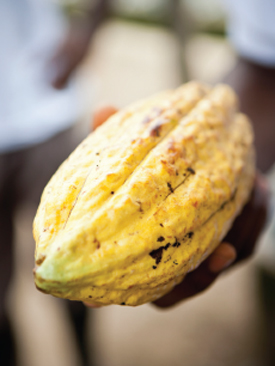Choose ethical chocolate to relieve farmer poverty
This article was originally published in February 2015
When you buy chocolate for your loved ones or yourself this month, remember that choosing ethically sourced chocolate is important. PCC announced almost two years ago that we would sell only fair trade chocolate. A new report reaffirms the reason for that decision. It details the struggle of West African cocoa farmers to earn decent livelihoods, despite increasing demand for cocoa and higher prices.

The report, “The Fairness Gap: Farmer Income and Root Cause Solutions to Ending Child Labor in the Cocoa Industry,” is based upon field research from the International Labor Rights Forum in Ghana and Côte d’Ivoire, where about 60 percent of the world’s cocoa comes from. It shows the poverty endured by West African farming communities continues to undermine efforts to end child labor and trafficking, and to advance sustainable cocoa farming.
Among other findings, the report notes that company efforts to improve working conditions, schools and supply certification are getting mixed reviews because of a failure to address the underlying poverty problem in Ghana and Côte d’Ivoire. It documents the economic drivers of poverty among cocoa farmers in these two West African nations and outlines recommendations for empowering farmers in their global supply chain.
Other key report findings include:
- Many cocoa farming families in Ghana and Côte d’Ivoire earn around the international poverty line of $2 per day. In large families, this amounts to roughly 40 cents per person.
- Low earnings make it difficult for farmers to pay hired laborers to harvest the crop at the legally required minimum wage. This fuels the impetus for child labor and, especially in Côte d’Ivoire, the trafficking of casual workers (including children) from neighboring Mali and Burkina Faso.
- The majority of cocoa farmers are isolated geographically and must rely on a vast network of middlemen to transport their beans. Farmers also lack price information and negotiating power.
- The average age of cocoa farmers is increasing as younger people seek alternative means of income. This increases the need for casual workers, who are even more marginalized.
“When I talked with cocoa farmers in Côte d’Ivoire, what struck me most was that western companies and NGOs had been talking to them for years about child labor and how to increase their yield, but none of them felt they had been consulted about what would actually help lift them out of poverty,” said Judy Gearhart, executive director of the International Labor Rights Forum.
“They are at such a disadvantage in the global marketplace,” says Gearheart. “Millions of cocoa farmers with only a handful of global buyers leads to a system in which farmers are voiceless, lacking access to information, and unable to negotiate for a better price. To fix the problems, we must focus on solutions that empower farmers so they can earn their fair share from this incredibly profitable industry.”
“Increasing consumer demand for chocolate made without child labor has pushed more and more companies over the past few years to confront their supply chains to understand where their cocoa actually comes from,” says Elizabeth O’Connell, fair labor campaigns director at Green America. “The best way for a company to ensure fair treatment of the farmers who grow its cocoa is to establish long-term and direct relationships with its farmers, and ensure a sustainable price is paid, one that covers all inputs including fertilizers and labor.”
